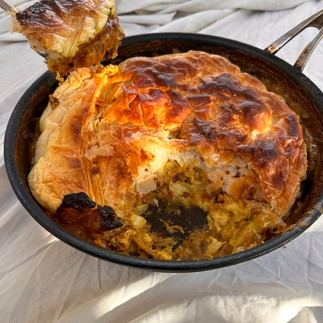Curried Cauliflower Cheese Pie
- Felicity Vincent

- Dec 14, 2024
- 5 min read
An easy vegetarian/vegan main for winter.
My curried cauliflower cheese pie is so quick and simple to put together, but it packs a punch. It's a go-to easy vegetarian recipe.
Make this either as an indulgent tasty twist on the classic cauliflower cheese side or serve it as a main dish. It's the ultimate comfort food recipe, perfect for Christmas too.

Ingredients (serves 4):
Curried cauliflower cheese pie recipe:
1 cauliflower
2 white onions
2 Tbs vegetable oil
1/2 tsp chilli powder
3 tsp garam masala
2 tsp ground turmeric
2 tsp nigella seeds
1 tsp mango chutney
1 tsp dijon mustard
2 garlic cloves
30g plain flour
500 mL milk (can use oat, soya or dairy)
100g cheese (use smoked vegan cheddar to make it vegan)
1 ready rolled puff pastry (check ingredient list if making this vegan)
Method:
First up, remove the cauliflower leaves and roughly chop them up. Then cut up the curds into bitesize chunks.
Boil water then add a couple of big pinches of salt. Add the cauliflower and cook for 7 minutes then drain. (This is blanching/par-boiling the veg.)
Cut the onions in half, then peel them before finely dicing them up.
Peel 2 garlic cloves, then crush or roughly chop them.
Grate the cheese.
Weigh out the milk in a jug, and the flour separately in a small bowl.
Use an oven proof frying pan if you have one, otherwise make the cauliflower cheese in a large shallow pan/saucepan and transfer into an ovenproof pie dish afterwards.
Place the pan on a medium heat and add the vegetable oil. When hot, add the chopped onion and brown them, stirring occasionally, for 5 minutes.
Add the ground spices, stir them in and let them toast in the pan for a minute before adding the mango chutney and dijon mustard.
Add the plain flour and stir it in. Leave on the heat, stirring a couple of times, for 2 minutes.
Pour in the milk while stirring, then bring the mixture to a boil.
Reduce the heat to a simmer, add the grated cheese and stir in until melted. Finally add the cauliflower and stir it in off the heat.
Leave to cool down while you preheat the oven at 200°C.
Unroll the puff pastry on top of the cauliflower cheese, tucking in the edges where required.
Bake for 45 minutes or until golden brown on top.
Serve up while it's warm and bon appétit!
More about this vegetarian pie recipe:
Shortcuts:
You can use shop bought white sauce/béchamel. Simply stir in the spices, grated cheese and pour onto the cauliflower.
Use this recipe for cauliflower cheese without the pie topping if you wish also.
You can swap out the puff pastry for shortcrust or scrunched up filo.
Keys to success:
This recipe is simple and no-fail, but feel free to pop your questions in the comments or message me and I'll be happy to help.
Health benefits of cauliflower:
They're a good source of:
vitamin B7 (biotin) which supports cell health and is needed to transform food into energy.
vitamin B9 (folate) which supports the formation of red blood cells and the production of serotonin;
vitamin B5 (pantothenic acid) which helps the body make red blood cells, produce certain hormones and release energy from food;
vitamin C which acts as a water-soluble antioxidant, protects cells, enables wound healing and helps maintain healthy skin, bones, cartilage and blood vessels; and is required to convert dopamine to noradrenaline;
vitamin K - which is required for blood clotting to support wound healing, and is necessary to support bone health; it is also required for the synthesis of sphingolipids which play an essential role in brain cell function, recent research has linked sphingolipid health with healthy aging and reduced risk of neurodegenerative disorders such as Alzheimer's and Parkinson's;
Cauliflowers also contain other beneficial compounds such as polyphenols (coumaric and vanillic acid) and glucosinolates (broken down when cut/cooked/digested into other beneficial compounds) which act as anti-oxidants and anti-inflammatories to protect against cancer and chronic diseases such as diabetes, cardiovascular diseases and neurodegenerative diseases (Alzheimer's). These are similar to those in broccoli, with some variations, but let's take a closer look:
Kaempferol (flavonoid - phenolic compound) - shows a positive association with reduced risk of cardiovascular diseases. Early studies have linked it to anti-diabetic properties, and some animal studies have even shown it blocks the build up of beta-amyloid plaque in the brain which leads to Alzheimer's disease.
Quercetin (flavonoid - phenolic compound) - may support heart health and lower high blood pressure, and has also been noted to reduce harmful bacterial growth and support the immune system in combatting viral infections and reducing allergy symptoms, as well as protecting against degenerative brain disorders.
Isothiocyanate (a product of the breakdown of glucosinolates) - improves our body's detoxification pathways, making it easier to excrete toxins and carcinogens such as cigarette smoke and pollutants. It has bactericidal properties towards some harmful bacteria, helping our good bacteria thrive. Finally, it has been linked to a reduced risk of cancer, most likely due to promoting cell death (apoptosis) and regulating cell proliferation.
Sulforaphane (a product of the breakdown of glucosinolates) - plays a similar role to isothiocyanate, early animal studies also indicate that it may play a role in kidney health.
Indole-3-carbinol (a product of the breakdown of glucosinolates) - another cancer preventive compound, it also improves oestrogen metabolism, helping to balance our hormone levels - ding ding ding good mood food!
Sulfur based compounds (responsible for broccoli's smell) and fibre support gut health and in turn the immune system and mental health. Sulfur compounds produce glutathione which plays a role in maintaining our gut lining and in general acts as an anti-inflammatory, protecting cell health.
Choline - essential nutrient, it is the precursor for the neurotransmitter acetylcholine and a component of certain structural lipids that make up cell membrane. It plays an important role in liver function, muscle health, learning and memory with early studies showing benefits to pharmaceutical choline intake on dementia patients. Eggs and offal are the best food sources of choline but cauliflower also makes a good source to have regularly. Some studies have shown a link between higher dietary choline intake and both visual and verbal memory, as well as sensorial perceptions.
Mood Food - Happy:
Choline - the precursor for the neurotransmitter acetylcholine required for cognition, memory and mood regulation in part. Early research shows a negative correlation with anxiety levels and depressive symptoms.
Folate - is linked to levels of serotonin, our good mood hormone often linked to a feeling of serenity; and not having enough folate therefore increases the chance of feeling depressed.
Vitamin C - is involved in converting dopamine to noradrenaline - low amounts of noradrenaline are associated with depression.
Vitamin K - Initial studies have shown promising results of a significant inverse relationship between vitamin K and depressive symptoms.
Hopefully this makes you excited to try this and many other cauliflower recipes during its season!
You can find lots of ideas on how to cook with cauliflower in my newsletter: https://felicityvincent.substack.com/
Video:
Cook along with this step-by-step video and learn how to make my cauliflower cheese pie recipe:
Photos:
















Comments